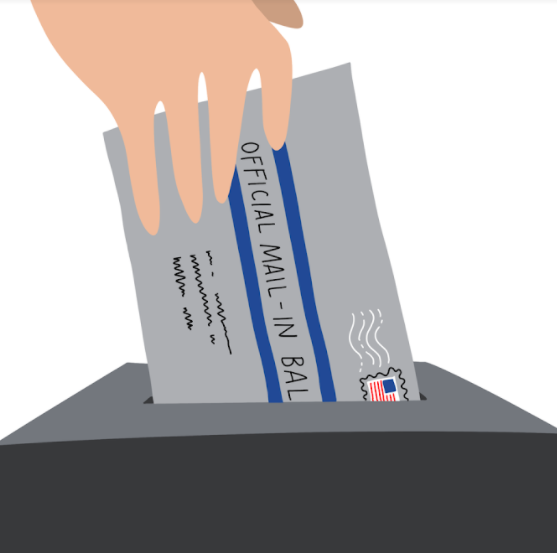I used to cringe at the radio every time NPR played a clip of the PostMaster General defending the mail-in ballot. I had full belief in the American voting system, and thought that this was simply another scandal to discourage voting.
My birthday, October 30th, put me right at the cut-off to be eligible for voting in the 2020 general election. I was ecstatic that I could finally make a personal difference in my state, where I spend time campaigning for various candidates throughout the year. Being from Florida, a swing state that typically leads to a candidate’s success, I am constantly reminded of my vote’s importance.
In November, I registered online in August 2020 and sent in my request for an absentee ballot to be sent to Deerfield. To register in Florida, a resident must fill out their information online and then mail in a signed form that requests for an absentee ballot to be sent to any location; however, for young voters that have not turned eighteen, they are not able to check their registration until after their birthdays because “pre-registered” voters will not show up in the system.

Fully confident that I completed all the necessary steps and having received a confirmation email, I patiently waited for November to roll around.
About two weeks before the election, I had heard lots of people mentioning that they had received their mail-in ballots and had already voted in various states. I was starting to get nervous, so I decided to call my local politicians to explain my tricky situation, and get the clarification that the voter registration website could not give me. I was told that Florida would not send my ballot until I turned eighteen, so I had to wait and quickly send the ballot overnight to my mother with an affidavit and a copy of my ID. My mother would then bring it to the election office for it to be counted in the general election, because it would not have arrived in time if I had simply sent it with the original return stamp.
October 30th rolled around, and the first thing I did was check my registration to make sure that my ballot was on its way. To my utter shock and disbelief, there was no record of me mailing in a request for an absentee ballot. I announced to my first period class, where for the past two weeks the election was the main topic of discussion, that I would not be receiving my ballot. My teacher began to help me search for my registration and sent me outside with the Miami-Dade Voting Help Hotline number in hand.
After the woman on the other side of the phone found my registration, she told me that they had never received the request for an absentee ballot, and the deadline to request one was October 26th — only four days earlier. I offered to send her the email confirmation of my request, but she said that nothing would change, that there was no way that the state of Florida would send my ballot. I was furious, but mostly disappointed in the mail-in ballot system that I had put so much faith in and even promoted to other voters around Florida as a safe and secure way of voting.
If the website had been young voter-friendly, this would have never happened. Had I been able to see that they had not received my request, I would have simply mailed another; but because my birthday was past the deadline, there was no way of knowing whether or not they had received my registration, let alone my request for an absentee ballot.
The most disillusioning part of this entire situation was that I was not the only one to not receive their absentee ballot. In fact, the only person to receive their absentee ballot in my family was my brother, a registered Republican, whose vote was received and counted. My father, a registered independent, and myself, a registered Democrat, were left without a means to vote. Luckily, my father was able to go to the polls, as he was in Florida at the time.
Ballots are still being counted, and there is no statistical evidence that there were flaws in the absentee ballot system yet. However, there are clearly rules in place that make it extremely difficult for young voters to ensure that their vote is being counted, especially since a major part of that population is in college and out of state. This will have major consequences for future voter turnout; it is proven that, the earlier in life a person votes, the more likely they are to continue voting. Many students and young Americans might not have the time or knowledge of how to vote if they are faced with these types of obstacles. I compel the Deerfield community, as I will myself, to continue to find ways to make sure your vote counts.

